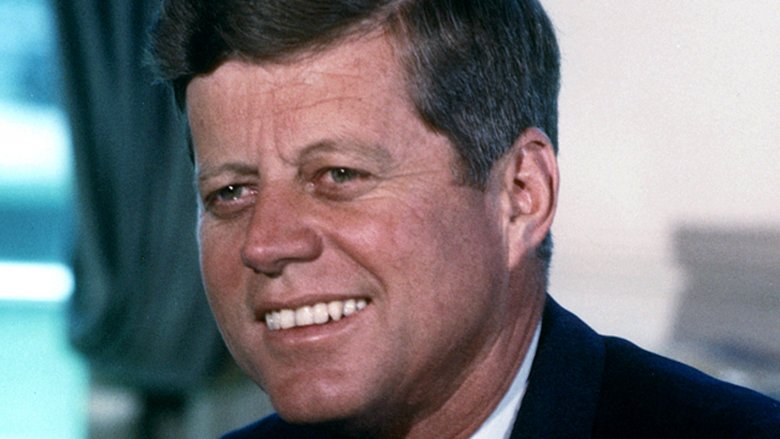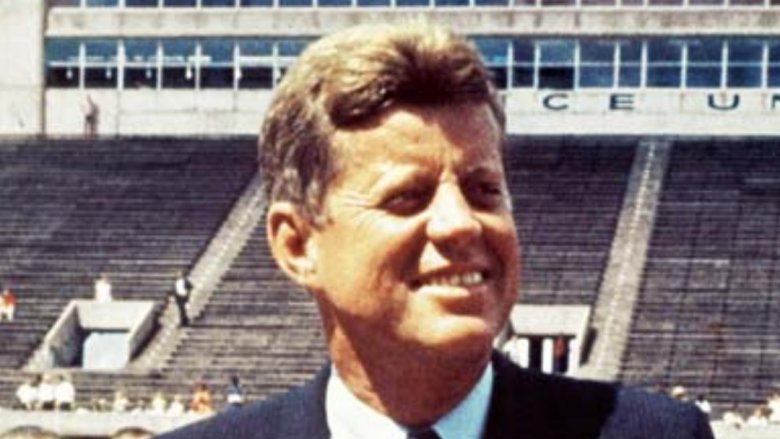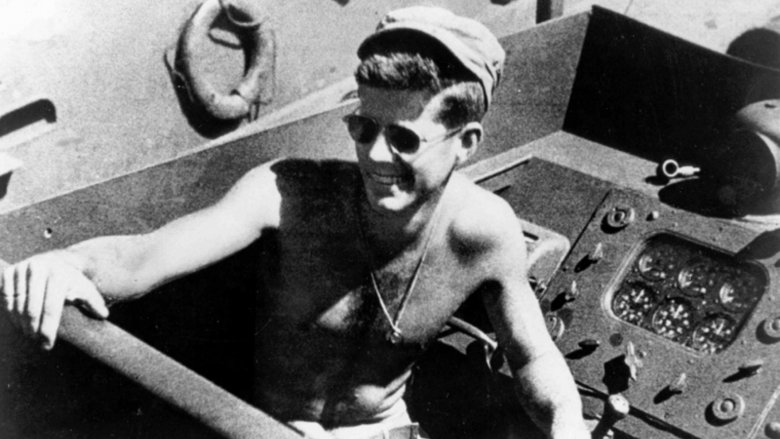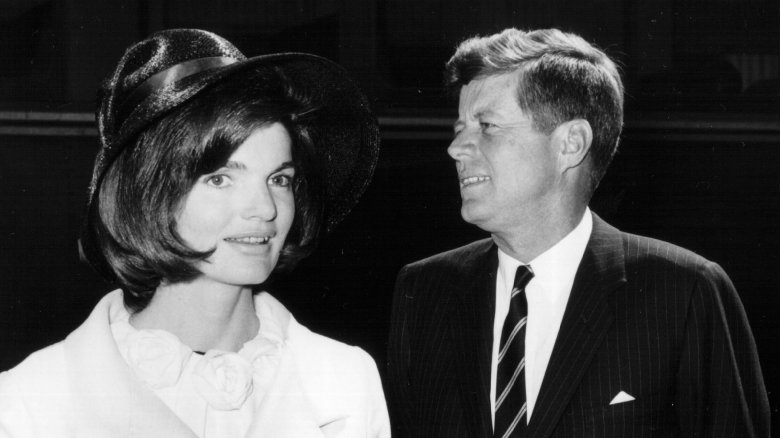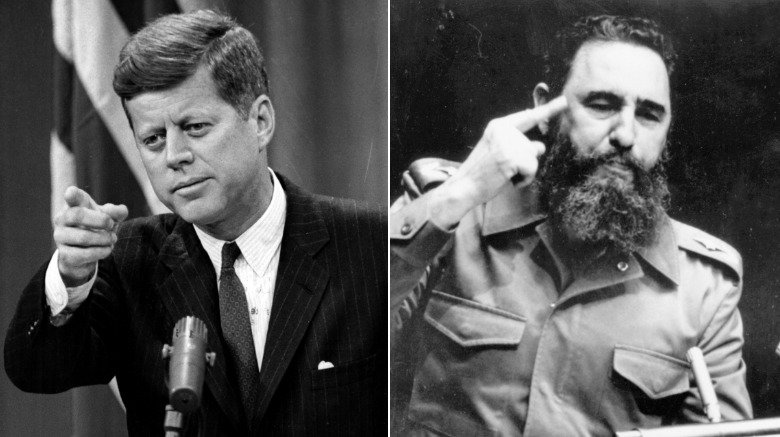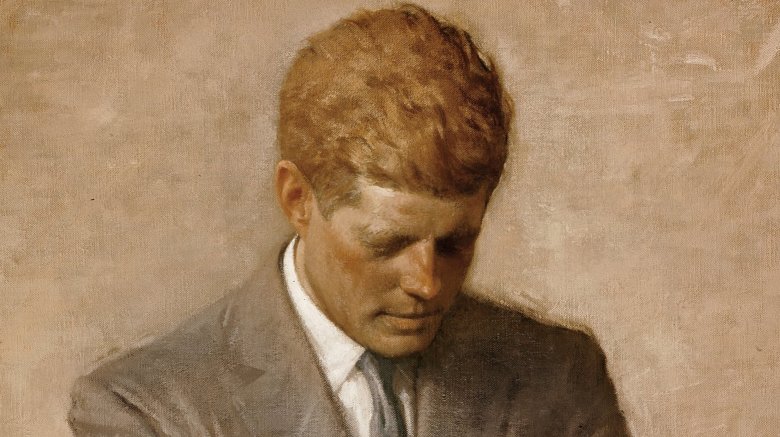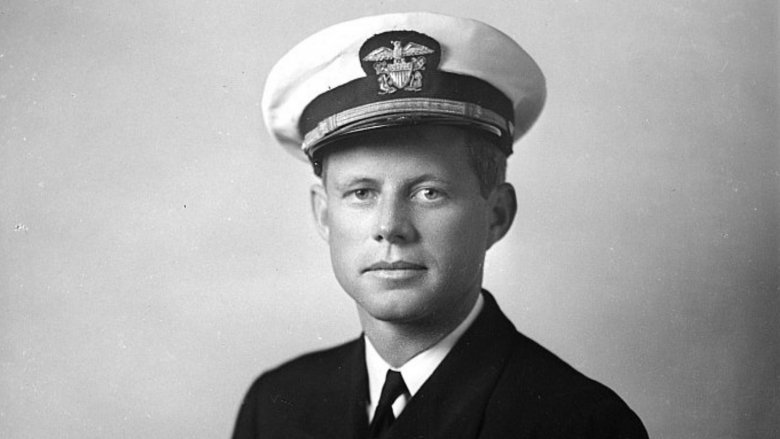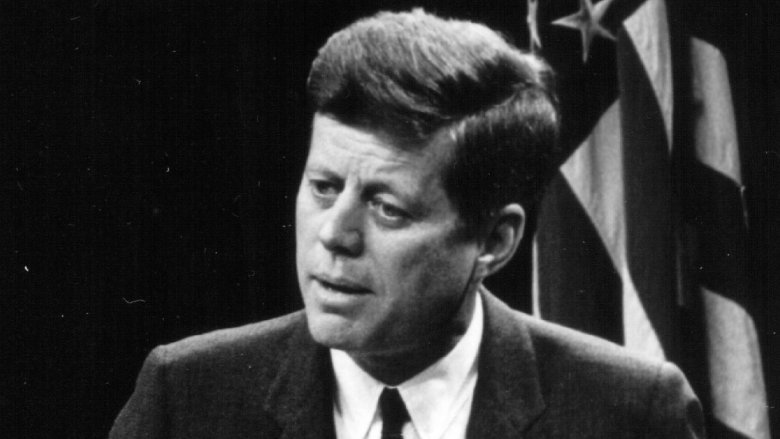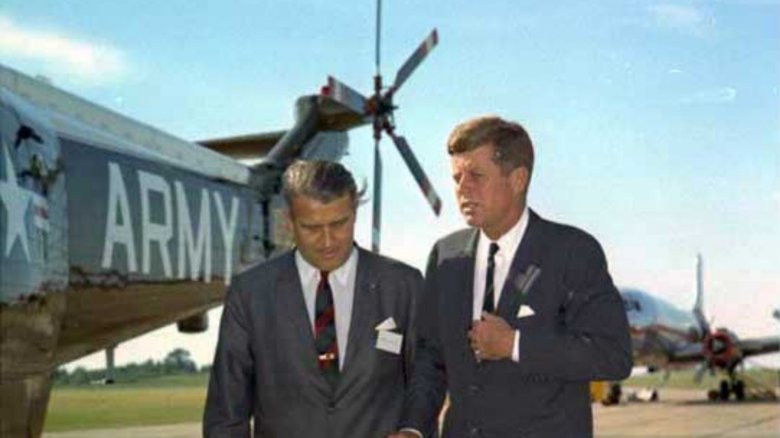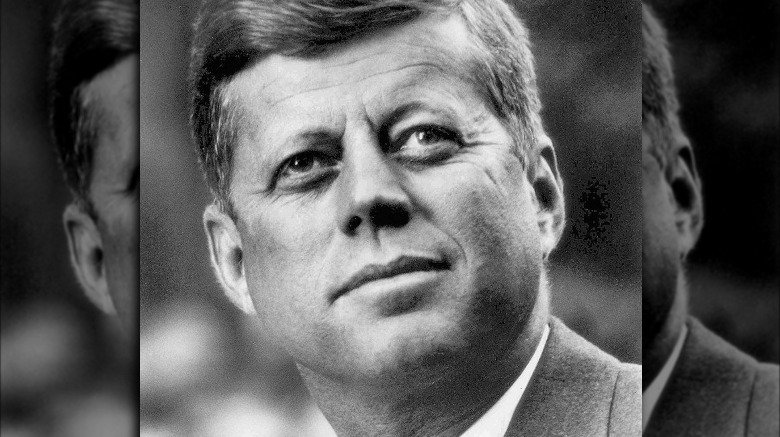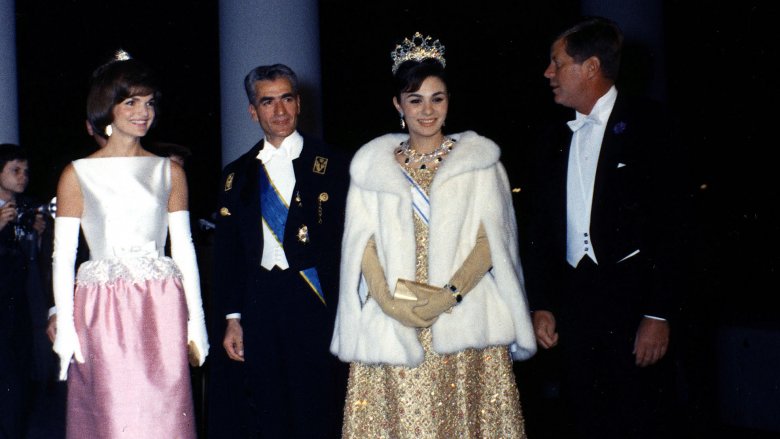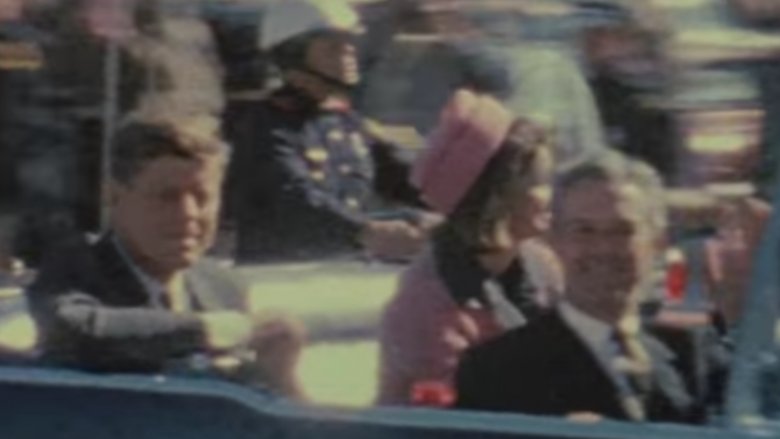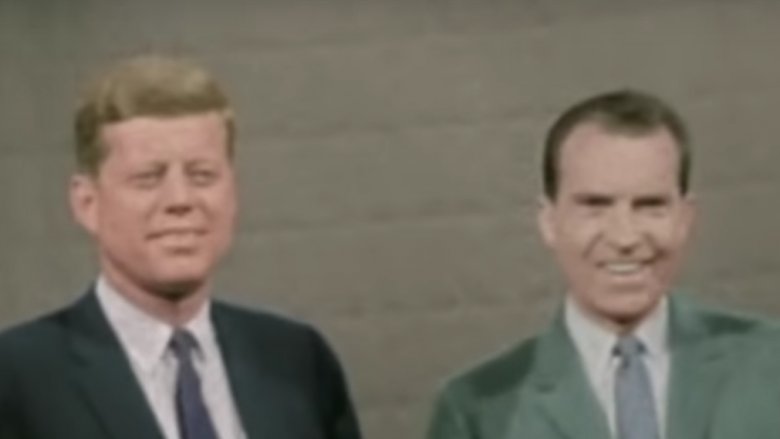What's Come Out About JFK Since His Death
We observe today not a rehash of a tragedy but a celebration of discoveries — symbolizing fame as well as infamy, signifying cover-ups as well as candor. For we have sworn to explore John F. Kennedy's life, just as our forebears did after his death in 1963. The world is very different now. For man holds in his mortal hands the power to read internet articles like this one. Yet JFK remains a towering figure in U.S. history and pop culture.
Kennedy captivated a nation in flux. After the ravages of World War II and the Korean War, with the Cold War heating up and the Civil Rights Movement making headway, Americans chose the charismatic Kennedy to lead, inspire, and protect them. He never got to finish that mission, and we have not finished learning about him. Over the years fascinating, scandalous, and ridiculous details have emerged, lighting a flame of curiosity that can truly light the World Wide Web. And so, our fellow readers, ask not what this article can do for you — ask what's come out about JFK since his death.
His iconic 'ask not' quote might have come from a school principal
On January, 20, 1961, JFK kicked off his presidency with a masterful speech. His inaugural address possessed a powerful balance of hope and foreboding, issuing warnings to America's potential enemies and urging allies across the globe to band together "against the common enemies of man: tyranny, poverty, disease and war itself." Then came a quote for the ages: "Ask not what your country can do for you — ask what you can do for your country."
It was like the "Help me help you" line from Jerry Maguire, except more epic. John F. Kennedy saw greatness on the horizon but needed fellow Americans to complete him. But was JFK's iconic "ask not" quote completely his idea? A notebook discovered in 2011 suggests it wasn't.
That notebook belonged to George St. John, former headmaster of the Choate School in Connecticut. A teenage JFK sat through St. John's sermons, and the headmaster's notes for those sermons included this familiar-sounding quote from Harvard dean LeBaron Briggs: "The youth who loves his Alma Mater will always ask, not 'What can she do for me?' but 'What can I do for her?'" Even before Briggs' quote came to light, author Thurston Clarke pointed out in 2004 that St. John was known to say, it's "not what Choate does for you, but what you can do for Choate," and Choate alumni noticed the similarity for years.
He fell in love with a possible Nazi spy
She was more like a beauty queen as she crossed the scene. In fact, she was a beauty queen in her native Denmark. Her name was Inga Arvad, but to JFK she was "Inga-Binga," and he was her "Boston Bean." According to Kennedy scholar Nigel Hamilton, Inga-Binga "was the great love" of the Boston Bean's life. Arvad was a journalist and worked at the same paper as JFK's sister, Kathleen. When Arvad first met the future president in 1941, she was married to one of the world's richest men. Four years older than Kennedy, Arvad would act as a sort of mentor, according to author Barbara Leaming. She critiqued his writing, dispensed political advice, and gave very hands-on lessons about the birds and the bees. While serving in World War II, Kennedy wrote to her: "Knowing you has been the brightest point in an already bright twenty-six years." Unfortunately, Hitler also enjoyed knowing her. Arvad had interviewed Hitler, who called her "a perfect example of Nordic beauty." She was extremely chummy with the fuhrer, and her husband may have been a Nazi agent.
Suspecting that Arvad was a spy, FBI agents watched her like voyeuristic hawks. They even eavesdropped on her pillow talk with JFK. Kennedy's father understandably didn't want him sleeping with a possible enemy, so the Kennedy patriarch put a stop to the romance.
Mental asylums and Jackie lookalikes
JFK was so promiscuous that venereal diseases probably feared catching him. He also had a soft spot for escorts, which made things awkward for his security detail. In 1997 the New York Times reported on the "embarrassment and anger" experienced by former Secret Service agents tasked with protecting America's most powerful John. Things probably also got awkward for the women who secretly serviced Kennedy, considering that lots of cops were likely nearby.
And what stopped the women from divulging Kennedy's juicy secret? Did he buy their silence with large tips? Did he tip them at all? Hopefully, but threats might have done the trick. For instance, in 1961, for JFK gave what History Link described as "a major foreign policy speech at the University of Washington Centennial Convocation." Afterward he got busy in an elevator with two prostitutes. A sheriff warned the women that if the public found out, they would be locked in a mental institution for life. Yikes.
Even JFK's taste in women was awkward. Legendary French madam Madame Claude alleged that Kennedy hired a Jackie Kennedy lookalike in Paris because "he wanted a more seductive" version of his wife. He wanted one so badly that he supposedly faked a doctor's appointment to try to meet his idealized substitute.
Hemingway's farm, the Second Coming, and other absurd plots from Operation Mongoose
The 1961 Bay of Pigs Invasion was a huge black eye for the Kennedy administration. In that massively bungled effort the U.S. used obsolete bombers to attack Cuba and missed bombing targets badly. Forces weren't coordinated, and men were captured or killed. After that stinging failure, Communist dictator Fidel Castro became JFK's white whale — or maybe red whale. Tapping into his inner Ahab, Kennedy put his brother, Robert, in charge of Operation Mongoose, which aimed to harpoon Castro once and for all.
Mongoose involved many plots, many of which were utterly crazy. One in particular wasn't so much Moby Dick as Old Man and the Sea — or as the Nation put it, "Old Man and the CIA." Per a memo uncovered in 1997, JFK and Robert greenlit an idea to somehow use Ernest Hemingway's Cuban farm in an attempt to assassinate Castro. And because Castro loved freediving, the CIA also proposed killing him with an exploding seashell or tampering with his diving suit. In an especially weird leap of logic, U.S. officials also thought they could trigger a revolt by tricking Cubans into thinking Christ had returned — a feat they hoped to achieve by illuminating the sky with pyrotechnics. Other ideas sounded more like trolling, like the plan to offer Cubans literally 2 cents to assassinate Castro. The CIA even sought the mafia's help.
He partly incited the Cuban missile crisis
People say history is always written by the winners. But are they winners because they actually won or because they wrote that they won? In the case of the Cuban missile crisis, it seems like the latter. For decades Americans have portrayed the crisis as a 13-day game of apocalyptic chicken that started when a totally unprovoked Soviet Union placed nukes in Cuba. Luckily, JFK had the fortitude, prudence, and suave Boston accent needed to prevent a nuclear calamity. He made the Soviets back down with nary a concession by America. But as the Atlantic explained, that entire narrative — save for the suave Boston accent — "is misleading or erroneous."
JFK probably could have melted an iceberg by seductively uttering "chowder," but he also inflamed the Cold War by placing missiles in Turkey and Italy — uncomfortably close to the Soviets. U.S. plots to take out Fidel Castro further stoked hostilities. The Communists responded with ominous posturing, but Soviet leader Nikita Khrushchev knew the U.S. could nuke him to kingdom come with its much larger arsenal. And despite promulgating the lie that America forced the Soviets to unilaterally remove their missiles, JFK withdrew U.S. missiles as well. However, he threatened to scrap the arrangement if the Soviets disclosed that fact. Kennedy's insistence on seeming unbudgeable became a template for U.S. foreign policy.
His hidden Addison's disease
People often associate JFK with vim, vigor, and other V-words, like "virile" and "venereal." But they probably don't think of vomiting, which is one of the many symptoms associated with an adrenal disorder called Addison's disease. Kennedy grappled with Addison's and other ailments throughout his life while projecting an image of physical robustness to the public. Biographies and medical records reveal that at age 2 he contracted scarlet fever. He matured into a frail and sickly teen who chronically lost weight. At age 15 JFK weighed just 117 pounds. Doctors thought leukemia might be the culprit, but it was colitis.
Kennedy spent much of his presidency in physical misery due to severe back trouble and Addison's disease, which causes infections, fatigue, joint and muscle pain, depression, skin discoloration, and various abdominal problems on top of the vomiting. The Atlantic reported that during the disastrous Bay of Pigs Invasion and the Cuban missile crisis "Kennedy was taking an extraordinary variety of medications."
With the help of his family, JFK mostly hid his abysmal health. However, political rivals caught wind of his condition and tried to expose him. During the 1960 presidential race Democratic hopeful Lyndon B. Johnson told the press — via his aides — that JFK had Addison's disease. But the revelation was dismissed as a smear. During that year's general election, Richard Nixon supposedly orchestrated a Watergate-style break-in to obtain JFK's medical records, but failed.
The mistress who was mysteriously murdered
Misfortune followed the Kennedy clan so closely that Senator Ted Kennedy wondered "whether some awful curse did actually hang over all the Kennedys." Even their romantic partners weren't safe. One of JFK's mistresses, for instance, was mysteriously murdered. You might think we're referring to his rumored paramour and naughty "Happy Birthday" singer Marilyn Monroe, whose death was definitely mysterious — and according to some, a murder. But here we're discussing a lesser-known name, someone the public had no idea was romantically involved with JFK before he died. That someone was Mary Pinchot Meyer.
"A talented artist" with "bohemian leanings," per Smithsonian, Meyer was Jackie Kennedy's friend and the ex-wife of Cord Meyer, who ran the CIA's clandestine operations. She allegedly started sleeping with JFK after untying the knot with her husband. Their affair went on for years and appeared to be ongoing in JFK's final days. It's believed that just weeks before his untimely demise Kennedy wrote Meyer a four-page love letter but never sent it. (That letter sold at auction for $89,000 in 2016.) Nearly a year after Kennedy died, Meyer was shot dead not far from the Potomac River. One suspect — a wet and wounded man discovered in the nearby woods — stood trial but was acquitted. As of this writing her murder remains unsolved.
He planned to withdraw from Vietnam
Well before Kennedy became president, the U.S. inserted itself into the Vietnam War. But as History detailed, it wasn't until the uber-dubious Gulf of Tonkin incident of 1964 that America opted to wage a full-tilt military campaign against North Vietnam. Had Kennedy still been president then, that escalation may never have happened.
Per the New York Times, "Pentagon documents declassified" in 1997 showed that in October 1963 JFK ordered the withdrawal of 1,000 military personnel from Vietnam by the end of the year. Publicly, Kennedy called withdrawal "a deep mistake." Behind closed doors, however, he rejected the joint chiefs' advice to take "overt action" and instructed them to take decidedly less action by leaving. Chagrined, his generals lobbied for covert CIA operations.
Roughly a month after JFK's withdrawal order, South Vietnamese President Ngo Dinh Diem — who had fallen out of favor with the U.S. military — was assassinated. JFK was killed three weeks later, and his successor, President Lyndon Johnson, bolstered both military and CIA operations almost immediately. CIA sabotage missions seemingly instigated the Gulf of Tonkin Incident. Experts heatedly disagree on whether Kennedy would have followed through with the exit plan, but according to LBJ's former deputy national security adviser, Kennedy definitely planned to have most U.S. forces out of Vietnam by the end of 1965, and on the day JFK died it was the "actual policy" of the U.S.
The fast and the frustrated
JFK was a bit like NBA legend Wilt Chamberlain in that he, uh, scored a whole lot. It's not our place to judge, but since JFK's romantic history plays such a huge role in the mythos surrounding him, revelations about it seem noteworthy. As commander-in-chief Kennedy couldn't really brag about his bedroom exploits like Wilt. Then again, according to Hollywood icon Marlene Dietrich, JFK didn't have much to brag about.
Dietrich got to know Kennedy biblically in 1962. Per a 2011 biography, the Golden Age legend said of the experience, "I don't remember most of what happened because it was all so quick." Dietrich wasn't done, remarking, "He seemed satisfied. Maybe much of it happened in his mind before he got there."
Dietrich wasn't alone in her assessment. JFK had numerous meetings with paid mistresses and supposedly became "known for the 'quick in-and-out.' He also received low approval ratings from his wife, who grew so frustrated that she reportedly told her doctor that JFK "just goes too fast and falls asleep." The doctor said he prescribed foreplay and described what do "using clinical" language. As unromantic as that sounds, it apparently worked.
The ugly side of JFK's wild side
In the words of philosopher king Mel Brooks, "It's good to be the king." Obviously, America doesn't allow monarchs, but Jackie Kennedy famously linked her husband to the Camelot myth during an interview. And the president used his lance a lot with maidens. Citing Seymour Hersh's 1997 book, The Dark Side of Camelot, the Atlantic described the tawdry debauchery JFK engaged in when Jackie was away, which was often.
Kennedy frequently skinny-dipped in the White House pool with two young secretaries nicknamed "Fiddle" and "Faddle." When he wasn't fiddling with them, he did unsavory things with a teenage intern named Mimi Alford. As Alford recounted in Once Upon a Secret, she got sucked into an 18-month affair with Kennedy when she was 19. It started on her fourth day of work. Per the New York Post, she recalled one of JFK's buddies giving her daiquiri after daiquiri before the president led her to his bedroom and began undressing her. She "was in shock" and he seemed completely unbothered by what he was about to do. Alford also attended JFK's pool parties, fearing that if she refused her coveted White House dream job would "slip away forever." While partying at Bing Crosby's place, the president allegedly forced her to take some kind of drug.
His bad back may have helped kill him
In his book The Dark Side of Camelot, author and journalist Seymour Hersh made the darkly karmic argument that JFK might have escaped assassination if he hadn't torn his groin while getting frisky with a woman by the White House pool. Supposedly, the injury forced him to wear a full-body brace, and it stopped him from ducking Lee Harvey Oswald's second bullet, which killed him. Newsweek panned Hersh's assertion as old news, noting that a Time magazine column said something similar in 1987 — about 10 years before Hersh's book came out. In 2017, however, a pair of neurosurgeons published a paper claiming that JFK's back, not his groin, was the reason he needed that brace.
Kennedy's spinal woes began while he attended Harvard. Experts believe he likely hurt his back playing football and worsened the injury while serving in World War II. He actually should have been barred from fighting because his back stopped him from passing the military's physical exams. However, his father, who was ambassador to Great Britain, pulled some strings. JFK ended up becoming a war hero, swimming for five hours to rescue crewmen after the Japanese attacked their boat in the Pacific.
A series of botched surgeries further aggravated Kennedy's back. As president he frequently wore a back brace that prevented him from tying his shoes, per the Daily Beast. He often needed crutches and used a modified forklift to board Air Force One.
Russia meddled in 1960, too
Thanks to the 2016 U.S. presidential race, the phrase "Russian meddling" probably elicits exhausted sighs from many Americans who've glutted their eyeballs and brains with stories about it. Don't worry, we won't relitigate that issue here. But we will say that Vladimir Putin is proof that history repeats itself in the darnedest ways. As the Washington Post noted, in 2017 Putin, a seasoned world leader, and President Donald Trump, a political newcomer, met face to face for the first time in Germany. Fifty-six years earlier, the more politically equipped Nikita Khrushchev met the much less experienced JFK for the first time in Austria. More bizarrely Khrushchev, who created the KGB, and Putin, who was in the KGB, were meeting presidents whose elections they interfered in.
Khrushchev was heavily invested in the outcome of the 1960 presidential race because he really didn't want Richard Nixon, a staunch anti-Communist, in the White House. Initially Soviet operatives reached out to Democratic politician Adlai Stevenson, urging him to run for president and offering propaganda assistance. But Stevenson "politely declined." The Soviets also offered to assist JFK's campaign, but Robert Kennedy delivered a "polite rebuff." So Khrushchev took matters into his own hands after the Soviets captured two U.S. pilots in 1960. Because Nixon was then vice president under Eisenhower, the Soviets refused to return the Americans in order to inflict political damage on Tricky Dick. Khrushchev even bragged about it in his 1970 memoir.
